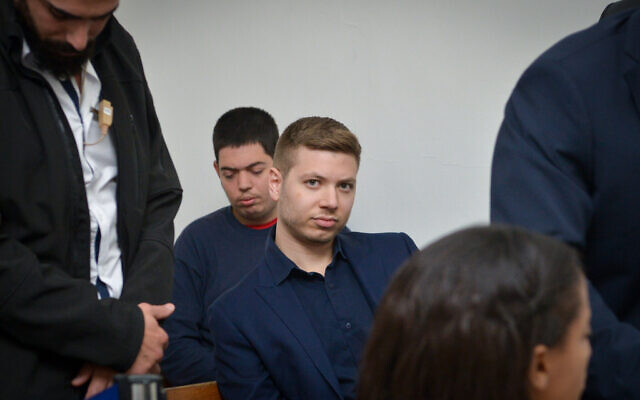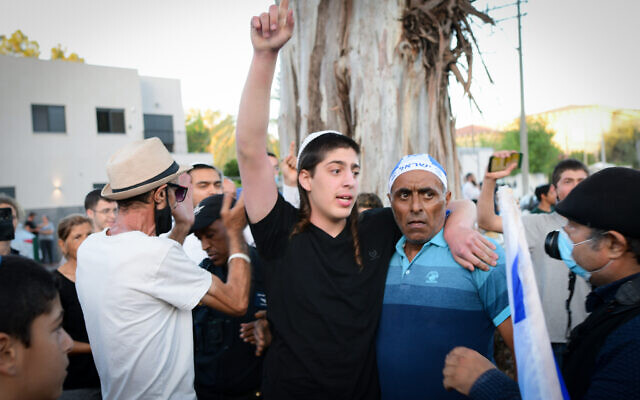Facebook, Instagram and Twitter lock accounts of PM’s son after he shares address of Yamina MK; Likud accuses sites of ‘censoring the right’

Yair Netanyahu, the prime minister’s son, said he has been temporarily blocked from Facebook, its image-sharing app Instagram and Twitter after sharing a poster calling for a protest outside Yamina MK Nir Orbach’s home.
The poster included the home address of Orbach, who is being targeted by Likud in the hope that he would jump ship and oppose the emerging “change government” that would oust Prime Minister Benjamin Netanyahu.
The ban on Facebook and Instagram is for 24 hours according to screenshots Netanyahu posted, while the Twitter ban is for 12 hours according to a statement from the site.
In a tweet, Netanyahu said that “Bolsheviks at Facebook blocked me for 24 hours over this picture! The big tech, deep state and pseudo-justice system — together with their puppets in the new government — are leading Israel to a very dark period. Let’s hope it won’t end with gulags.”
He was then blocked on Twitter for that tweet, which also included the image of the demonstration poster.
The bans were all related to posting the personal address of the MK, which violates the rules of each site.
Netanyahu’s Likud party condemned the ban in a series of English-language tweets titled “CENSORING THE RIGHT.”
CENSORING THE RIGHT: Twitter and Facebook are suspending right-wing activists for promoting protests outside the homes of Knesset Members planning to join the dangerous leftwing government being formed
— הליכוד (@Likud_Party) June 4, 2021
“Twitter and Facebook are suspending right-wing activists for promoting protests outside the homes of Knesset Members planning to join the dangerous leftwing government being formed,” Likud tweeted.
“Yet at the same time, Twitter and Facebook are allowing left-wing activists to promote counter-protests at the homes of the same MKs listing the exact same addresses for which the right-wingers were suspended, they added, referring to the anti-Netanyahu Crime Minister protest group, that posted Orbach’s address for a counter-protest.
“This is a textbook case of political censorship of the right,” it said.
Right-wing radio personality Yotam Zimri was also banned from Facebook for 24 hours over sharing the protest invitation, he said in a tweet.

Yair Netanyahu is no stranger to social media controversy. He has a history of posting incendiary messages on social media, and he tweets fast and often against those he believes have wronged him and his family, leading to a slew of libel lawsuits and legal threats.
The move is part of a wider effort by social media sites to crack down on incitement.
On Thursday it was reported that Facebook plans to end a contentious policy championed by CEO Mark Zuckerberg that exempted politicians from certain moderation rules on its site.
The company’s rationale for that policy held that the speech of political leaders is inherently newsworthy and in the public interest even if it is offensive, bullying or otherwise controversial. The social media giant is currently mulling over what to do with the account of former US president Donald Trump, which it “indefinitely” suspended Jan. 6, leaving it in Facebook limbo with its owners unable to post.
The change in policy was first reported Thursday by the tech site The Verge and later confirmed by The New York Times and the Washington Post.
Facebook has had a general “newsworthiness exemption” since 2016. But it garnered attention in 2019 when Nick Clegg, vice president of global affairs and communications, announced that speech from politicians will be treated as “newsworthy content that should, as a general rule, be seen and heard.”
The newsworthiness exemption, he explained in a blog post at the time, meant that if “someone makes a statement or shares a post which breaks our community standards we will still allow it on our platform if we believe the public interest in seeing it outweighs the risk of harm.”
This hasn’t given politicians unlimited license, however. When Facebook suspended Trump in January, it cited “the risk of further incitement of violence” following the deadly insurrection at the US Capitol as the reason. The company says it has never used the newsworthiness exemption for any of Trump’s posts.
Facebook declined to comment.
As reported The Times of Israel
